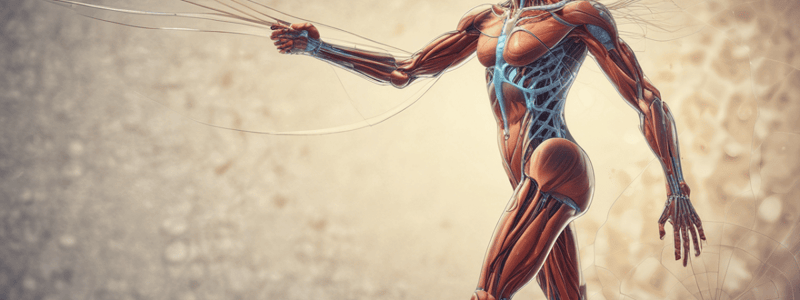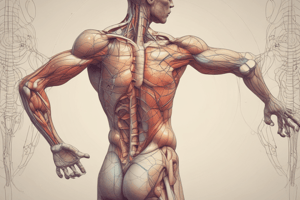Podcast
Questions and Answers
What happens to the body's core temperature during exercise?
What happens to the body's core temperature during exercise?
- It remains constant (correct)
- It fluctuates randomly
- It increases
- It decreases
What is the primary function of insulation in the skin, as described in the analogy to a house?
What is the primary function of insulation in the skin, as described in the analogy to a house?
- To generate heat in the body
- To prevent loss of heat from the body (correct)
- To regulate blood pressure in the body
- To increase heart rate in the body
What is the primary function of capillary beds in the skin?
What is the primary function of capillary beds in the skin?
- To insulate the body
- To produce sweat
- To exchange oxygen between the blood and the tissue (correct)
- To regulate body temperature
What happens to the capillaries near the surface of the skin when the body is overheating?
What happens to the capillaries near the surface of the skin when the body is overheating?
Why does the body produce heat during exercise?
Why does the body produce heat during exercise?
What is the purpose of the skin in regulating body temperature?
What is the purpose of the skin in regulating body temperature?
Why is it important for the body to maintain a core temperature of 98.6°F?
Why is it important for the body to maintain a core temperature of 98.6°F?
What happens to the capillaries in the skin when it's cold outside?
What happens to the capillaries in the skin when it's cold outside?
What is the role of arterioles in the skin?
What is the role of arterioles in the skin?
How does the body regulate the size of blood vessels?
How does the body regulate the size of blood vessels?
Why does the body need to maintain its core body temperature?
Why does the body need to maintain its core body temperature?
What is the result of vasodilation in the capillaries near the surface of the skin?
What is the result of vasodilation in the capillaries near the surface of the skin?
What is another way the body gets rid of excess heat besides sweating?
What is another way the body gets rid of excess heat besides sweating?
What is the ideal temperature for the body during exercise?
What is the ideal temperature for the body during exercise?
Why do hands feel extremely cold on a cold day?
Why do hands feel extremely cold on a cold day?
What is the purpose of the 'windows' in the analogy to a house?
What is the purpose of the 'windows' in the analogy to a house?
What happens to the surface area of the skin when the body is cold?
What happens to the surface area of the skin when the body is cold?
What is the term for the increased diameter of blood vessels, resulting in increased blood flow?
What is the term for the increased diameter of blood vessels, resulting in increased blood flow?
Flashcards are hidden until you start studying
Study Notes
Exercise and Body Temperature
- When exercising, the body produces a lot of heat due to muscle activity, which can lead to a problem maintaining the core body temperature of 98.6°F.
- One way the body gets rid of excess heat is through sweating, but another way involves the skin and blood vessels.
Skin and Blood Vessels
- The skin acts as insulation, keeping heat in when it's cold outside, but it also has blood vessels (capillary beds) that allow for heat exchange between the blood and tissue.
- These capillary beds are like "windows" that allow heat to escape past the skin's insulation.
Vasodilation and Heat Loss
- When the body is overheating, it opens up these "windows" (dilates the capillaries) through vasodilation, allowing more blood to pass through and increasing heat loss to the surroundings.
- Vasodilation increases blood flow to the skin's surface, resulting in more heat loss and helping the body maintain its core temperature.
Body Temperature Regulation
- The body maintains a core temperature of 98.6°F because it's the optimal temperature for the body's chemical reactions and machinery to function properly.
- The body regulates its temperature by controlling the size of its blood vessels, which affects how much heat is lost through the skin.
Constriction and Cold Weather
- When it's cold outside, the body closes these "windows" (constricts the capillaries) to reduce heat loss, making the skin's surface area colder.
- This is why hands feel extremely cold on a cold day, as the capillaries in the skin are constricted to minimize heat loss.
Regulation of Blood Vessels
- Blood vessels have smooth muscle cells that control their size, making them smaller when they contract and larger when they relax.
- The body regulates the contraction and relaxation of these smooth muscle cells through nerve impulses, controlling blood flow and heat loss.
Studying That Suits You
Use AI to generate personalized quizzes and flashcards to suit your learning preferences.




